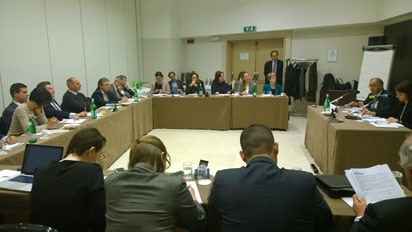
On May 13, the FPSC held in Rome in hotel NH Giustiniani, a new working breakfast with ambassadors and journalists, entitled “A Latin American Pope in the Holy Land”, coinciding with the 50th anniversary of the significant pilgrimage to the region of Paul VI in 1964, the first visit of a pontiff in modern times, and the upcoming visit of Pope Francisco, beginning on 25 this month.
The meeting was organized by Mediatrends (ww.mediatrendsamerica.com) and FPSC.
The Ambassador of Israel to the Holy See, Zion Evrony was the main speaker who held that the Pope Francisco’s trip to his country will be very positive and give a strong impetus to interreligion dialogue and peace in the region, mainly considering the fact that he is accompanied by a Muslim religious leader and a rabbi, who represent the three monotheistic religions in this event it will have a major impact in the Holy Land.
The ambassador considered that the personal experience of each Pope influences the relationship, style and nature of the visit and that the Pope Francis had already established relationships with the Jewish community in Argentina as well as participated in a television program with the rabbi Skorka. He had also witnessed two attacks in Argentina, one to the embassy of Israel and another to the Jewish centre, and he always had a sense of empathy, identifying himself with the Jewish people suffering, and showing himself against terrorism, the use of violence in the name of religion and God.
On the peace process, he underlined that the current Pope is a great spiritual leader, a peace messenger and the struggle for peace is the central theme of his speeches and homilies. The dialogue with religious leaders in Israel will be very important, since they are the ones who can help to reduce the animosity between the two parties in conflict, and contribute to build bridges.
With regard to interreligion dialogue, completed fifty years of the document “Nostra Aetate”, he said the visit will bring positive results, calling it “an opportunity to search new ways to improve the dialogue relationship.”

